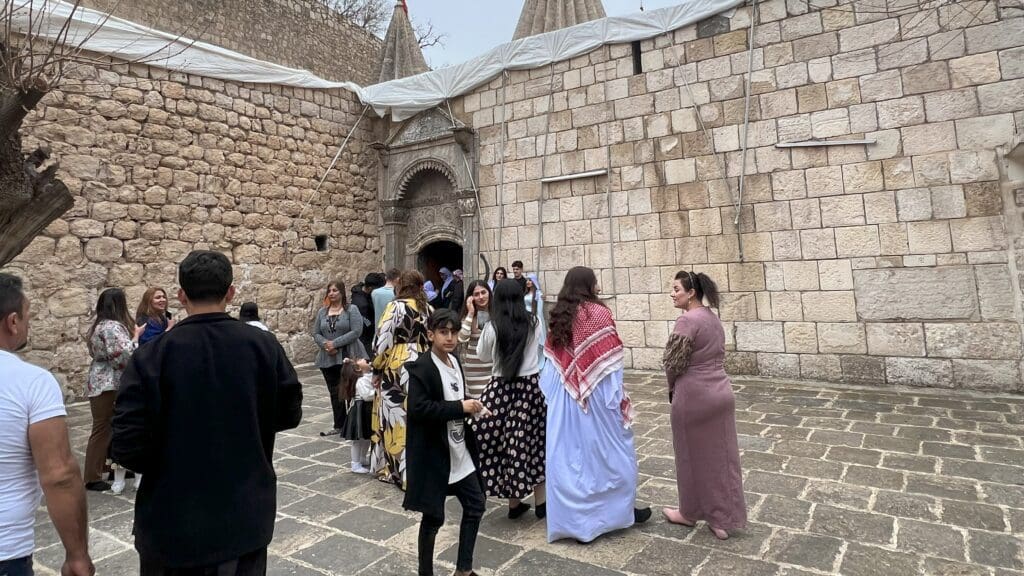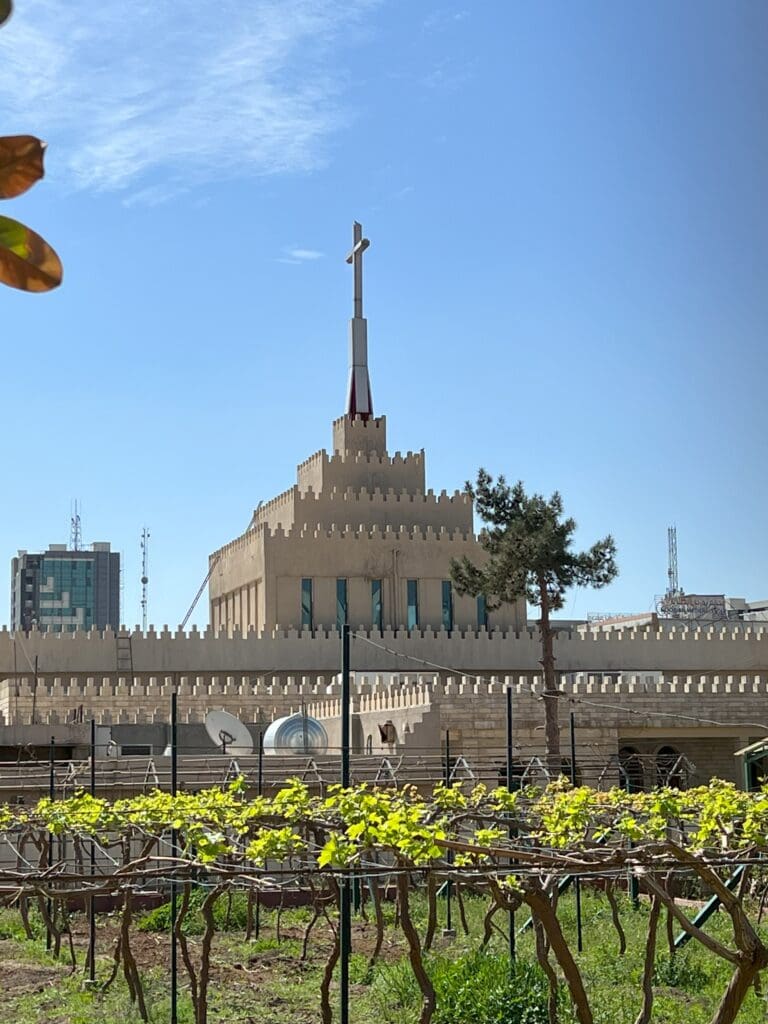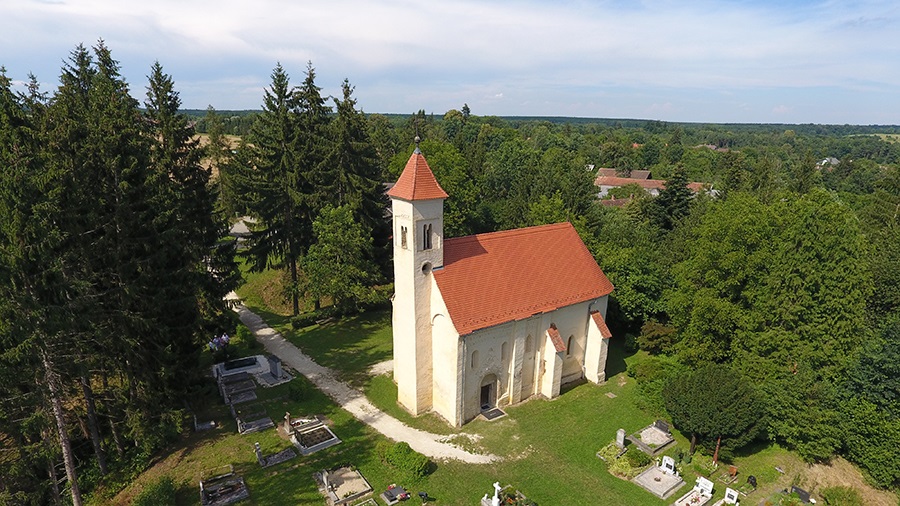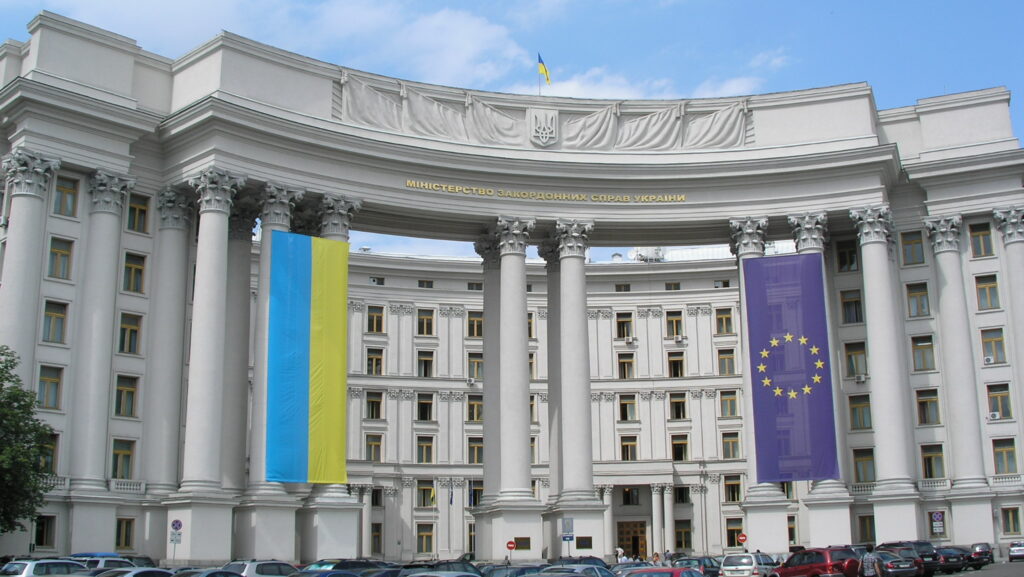Reflections from the Danube Institute’s field research in Iraq’s northern Kurdish region — the trials that Christians there face today, the policy Hungary is forming to address it, and what it may mean for the future of international aid efforts.
Northern Iraq’s Kurdistan region is a part of the world that suffers the scars of religious conflicts; both ancient enough to be recorded in stone carvings and recent enough to appear in global headlines. One such conflict that can be attributed to both categories is the endemic persecution of Christians in the region. Most of the world is familiar with the atrocities the community has suffered at the hands of ISIS during conflict’s height from 2014 to 2016. But few are educated in the long history of Christian persecution before the rise of ISIS and the issues they face after its fall.
While the Christian community in the Middle East has a story as old as the Bible itself, it looks as if the religion’s regional presence is now facing its final days. International aid efforts to provide them a future in their homeland have done little to stem their departure from the country. Issues facing the community include not only hampered efforts to rebuild after the war, but determining what kind of future they have in the region when they are faced with broken inter-communal relations and faltering government support.
Despite the darkening picture for the Christian community, small rays of light still shine through from the West
in an effort to preserve their ancestral roots. One of them originates in another small country sitting at the foot of mountains, these ones in the Carpathian Basin—the Central European nation of Hungary.
Hungary has recently been making its presence known in the world of international aid, with its most recent efforts being in earthquake-ravaged Turkey. The small nation has focused its initiatives on providing aid to oppressed Christians, which now face record-level highs of global persecution today. Global aid has poured in to relieve the suffering of the region’s minorities following the end of the war against ISIS, during which the region’s Christians, along with other minority communities such as the Yazidis, suffered barbaric crimes.
As a part of its humanitarian outreach efforts, the Hungarian government recently supported a research expedition this spring conducted by the Danube Institute, a Budapest-based think tank, to Iraqi Kurdistan. The author of this article was a part of that team. The goal of this initiative was to provide Hungarians, and the wider world, with on-the-ground knowledge of the challenges and issues of the region as well as to increase awareness of the suffering.
The fieldwork conducted by the Danube Institute’s team incorporated interviews with the Christian community as well as others such as the Yazidis, along with Kurdish regional government officials. The conversations we had were across the spectrum of society, from Church leaders to everyday followers of the faith, village elders and youth activists serving in various community organizations, top political and military leaders, humanitarian aid workers, and Yazidi internally displaced persons and refugees scraping by after surviving the war with ISIS. What the Danube Institute’s team discovered was a unique insight into the struggles still plaguing the region even after the end of the conflict.

Since the fall of Saddam’s tyrannical regime, during which time Christians were still subject to brutality but still found a measure of societal stability, the faithful have faced an increasingly volatile environment, reaching an apex with the murderous rampage of ISIS across the region. Church officials, community leaders, and everyday people told stories of continued setbacks to re-establish their lives and develop a future, partially due to neglect at the hands of governing authorities. An underlying mistrust between Christians and the region’s Muslims from the breakdown in inter-communal relations after the ISIS conflict has also endured.
Lack of social services, resources, and proper representation, as well as an indirect effort to force them from their ancestral lands, were among the accusations by the Assyrians, Yazidis, and other minorities in regards to their status. The numbers support their claims: once standing at about 1.5 million in 2003, the number of Christians in Iraq now stands at less than a quarter of a million today. The actual figure may be considerably lower but unacknowledged so that the Christians may maintain what little political representation they still have in the country.
A notable departure from other national and international aid agencies in doctrine is
Hungary’s strategy to work through the Iraqi churches and domestic societal organizations as the intermediaries for their financial support instead of local Iraqi governmental authorities.
This strategy has been the primary doctrine of Hungary Helps, the Hungarian government’s official global aid agency. The reconstruction of destroyed churches, even entire towns, has come to pass through the Hungarian strategy, earning it the status as a nation specifically attuned to Christian suffering and alleviating it as a matter of foreign policy.
The strategy addresses a key issue in Iraq’s reconstruction. Noted both by international watch groups and the Christians themselves through our team’s interviews, is the matter of aid not reaching the Christian community. Both national resources meant for their recovery and international supplies and funding meant to bolster such efforts, have not made it to the minority communities they were meant to support. Corruption, ineptitude, even accusations of conspiracy against the Christian minority to push them out of the region have left the community feeling forgotten by their country and the wider world. But Hungary’s strategy has ensured that some aid is dedicated to the faithful by facilitating it through the community’s own institutions such as churches and local community-level organizations. Numerous times we were told through the course of our interviews how grateful people were for the Hungarians’ good will.

Along with aid to the Christian population, Hungarian support has also materialized for other minority groups. One example includes providing vocational training through the Free Yazidi Foundation to Yazidi women who are still taking shelter in IDP and refugee camps. Other efforts entail financial and material support to societal organizations like the Assyrian Aid Society to rebuild cultural communities.
This aid is a component of Hungary’s small, but increasing footprint in the Middle East.
Relations between Budapest and the Kurdish Regional Government is a relationship is one of the more well-known examples of such growing relations. Hungary provided arms and munitions as well as military security forces to support Kurdistan during the fight against ISIS. It opened a consulate in Iraqi Kurdistan’s regional capital city of Erbil in 2014. At one point, Hungarian Prime Minister Viktor Orbán even alluded to supporting Kurdistan’s independence while praising its efforts against ISIS, something which no doubt spun heads in Ankara and Baghdad.
When it comes to the relationship between Hungary and Kurdistan, there are some interesting commonalities. Both are small states in dangerous geopolitical arenas in which they have been at the mercy of larger, often hostile, powers. As such, the question of their identity and survival have often been in danger. The matter of preserving Christianity in the region gives both Hungary and Kurdistan another point of connection, notably one of cultural significance. When Saint Stephen first established the Kingdom of Hungary over a millennia ago, the Christian faith was a pillar of the Hungarian identity. Today, efforts to preserve Christianity in a country that is still fighting for its survival, while not it’s primary religion, still likely tugs at Hungarians’ cultural memory.
Hungary’s efforts in Kurdistan have been a special focus for its leaders. Its international aid strategy has been touted by Tristan Azbej, the Hungarian State Secretary for the Aid of Persecuted Christians and the Hungary Helps Programme, as a model for other aid organizations to emulate. Hungary’s President, Katalin Novák, paid an official visit to the opening of an international school in Erbil last year, which was one of the strategy’s more internationally recognized accomplishments.
Katalin Novák on Twitter: “First ever #Hungarian 🇭🇺 presidential visit to Iraq 🇮🇶 pic.twitter.com/Difr8yAePV / Twitter”
First ever #Hungarian 🇭🇺 presidential visit to Iraq 🇮🇶 pic.twitter.com/Difr8yAePV
Such achievements have provided a measure of hope for a future for Christians and other minorities, but the momentum is still in the opposite direction.
The Christian population of Iraq is plagued not only by inept governance and the grim realities of their neighborhood, but also by the potential of better futures abroad.
Young Iraqi Christians are leaving their homeland for other nations with stronger economies and more stable societies.
The chance to live in apartments rather than in villages, poor urban neighbourhoods, or IDP camps and earn stable paychecks that promise lives of dignity rather than barely scraping by in poverty, is costing the region its youth. Church and community leaders expressed fear not only for the community’s future in the region, but also over the youth losing their culture after moving to other countries. All too often our research team’s interviews were with village elders or senior leaders in the cities of Erbil and Duhok who expressed fears that the departing youth were destined to lose their language and community identity once they joined the melting-pot nations of the West.
This trend is one that crosses borders in the Middle East and may spread even further.
Iraq’s geopolitical neighbour, Syria, also faces a similar exodus for the same reasons. Egypt, Sudan, Yemen, and Libya also see their Christian populations being both collateral damage in conflicts between aggressors and targeted by their governments, neighbours, and international terrorist actors like ISIS. Persecution is on the rise, and with it, the potential that these populations may flee their ancestral homelands too. Hungary’s strategy of working directly with Christian institutions to stabilize their communities is likely to see an increased need in other troubled lands.








